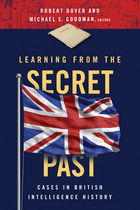
Identifying “lessons learned” is not new—the military has been doing it for decades. However, members of the worldwide intelligence community have been slow to extract wider lessons gathered from the past and apply them to contemporary challenges. Learning from the Secret Past is a collection of ten carefully selected cases from post-World War II British intelligence history. Some of the cases include the Malayan Emergency, the Cuban Missile Crisis, Northern Ireland, and the lead up to the Iraq War. Each case, accompanied by authentic documents, illuminates important lessons that today's intelligence officers and policymakers—in Britain and elsewhere—should heed.
Written by former and current intelligence officers, high-ranking government officials, and scholars, the case studies in this book detail intelligence successes and failures, discuss effective structuring of the intelligence community, examine the effective use of intelligence in counterinsurgency, explore the ethical dilemmas and practical gains of interrogation, and highlight the value of human intelligence and the dangers of the politicization of intelligence. The lessons learned from this book stress the value of past experience and point the way toward running effective intelligence agencies in a democratic society.
Scholars and professionals worldwide who specialize in intelligence, defense and security studies, and international relations will find this book to be extremely valuable.

Intelligence agencies provide critical information to national security and foreign policy decision makers, but spying also poses inherent dilemmas for liberty, privacy, human rights, and diplomacy. Principled Spying explores how to strike a balance between necessary intelligence activities and protecting democratic values by developing a new framework of ethics.
David Omand and Mark Phythian structure this book as an engaging debate between a former national security practitioner and an intelligence scholar. Rather than simply presenting their positions, throughout the book they pose key questions to each other and to the reader and offer contrasting perspectives to stimulate further discussion. They demonstrate the value for both practitioners and the public of weighing the dilemmas of secret intelligence through ethics. The chapters in the book cover key areas including human intelligence, surveillance, acting on intelligence, and oversight and accountability. The authors disagree on some key questions, but in the course of their debate they demonstrate that it is possible to find a balance between liberty and security. This book is accessible reading for concerned citizens, but it also delivers the sophisticated insights of a high-ranking former practitioner and a distinguished scholar.

Researchers in the rapidly growing field of intelligence studies face unique and difficult challenges ranging from finding and accessing data on secret activities, to sorting through the politics of intelligence successes and failures, to making sense of complex socio-organizational or psychological phenomena. The contributing authors to Researching National Security Intelligence survey the state of the field and demonstrate how incorporating multiple disciplines helps to generate high-quality, policy-relevant research. Following this approach, the volume provides a conceptual, empirical, and methodological toolkit for scholars and students informed by many disciplines: history, political science, public administration, psychology, communications, and journalism. This collection of essays written by an international group of scholars and practitioners propels intelligence studies forward by demonstrating its growing depth, by suggesting new pathways to the creation of knowledge, and by identifying how scholarship can enhance practice and accountability.
READERS
Browse our collection.
PUBLISHERS
See BiblioVault's publisher services.
STUDENT SERVICES
Files for college accessibility offices.
UChicago Accessibility Resources
home | accessibility | search | about | contact us
BiblioVault ® 2001 - 2024
The University of Chicago Press









